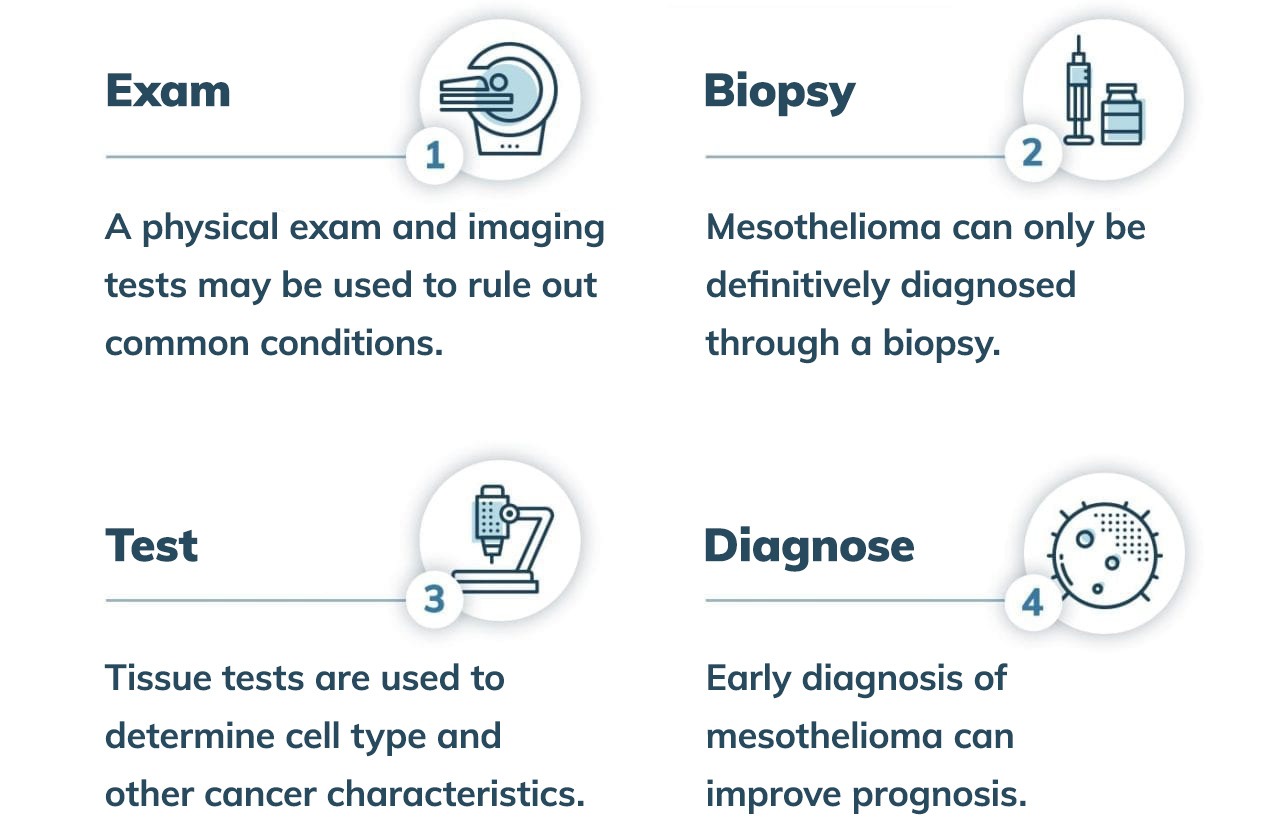Table of Contents
Home → Mesothelioma → Diagnosis
Mesothelioma Diagnosis
Malignant mesothelioma is usually diagnosed based on information from multiple tests. This process typically begins when a patient experiences symptoms. Since mesothelioma symptoms, especially earlier ones, can resemble symptoms of other illnesses, it’s crucial for patients to inform their doctors about any potential asbestos exposure.
Key Facts
- A doctor may order a variety of tests, including blood tests and imaging scans, to help them make a mesothelioma diagnosis.
- A biopsy is the only test to definitively confirm a mesothelioma diagnosis.
- A mesothelioma diagnosis generally takes two to six months.
- Mesothelioma is often not diagnosed until a patient begins experiencing symptoms.
How Is Mesothelioma Diagnosed?
Diagnosing mesothelioma commonly begins with a review of a patient’s medical history. This is also an opportunity for patients to mention any known or suspected asbestos exposure. A patient’s doctor will usually do a physical examination to check for abnormalities. Then they may administer imaging tests, like X-rays, and blood work. These early tests may also help doctors narrow down diagnosis possibilities or rule out other illnesses.
After these initial tests, an oncologist may order more advanced diagnostic procedures like biopsies.
Imaging Tests
Imaging tests can help doctors identify tumors and where they’re located, as well as the metastasis of mesothelioma cancer. These imaging scans may include:
- CT scans provide a series of detailed images of organs and tumors.
- MRI scans create images of structures in the body such as organs. These scans can help detect the spreading of cancer.
- PET scans can help distinguish between healthy and cancerous tissue.
- X-rays allow doctors to see inside a patient’s body and help detect abnormalities. X-rays can help rule out other illnesses.
Specific imaging may vary from patient to patient. An individual’s doctor can provide further information on specific tests ordered as well as any preparation needed.
Blood Tests for Biomarkers
Mesothelioma has a long latency period. This means it can take several years after exposure for symptoms to start. In fact, mesothelioma symptoms usually show up 10–50 years after exposure.
Unfortunately, common mesothelioma symptoms are often similar to other diseases. These similarities can make diagnosing mesothelioma tough. Common symptoms include:
- Pain in the chest or belly
- A persistent cough and difficulty breathing
- Feeling very tired or weak
- Fever and night sweats
- Loss of appetite and unexplained weight loss
Remember, asbestos exposure causes mesothelioma. Talk to your doctor if you have these symptoms, and you know you have known asbestos exposure.
Blood Tests for Biomarkers
Doctors may order blood tests to help find biomarkers indicative of mesothelioma or other cancers. Biomarkers are substances in the blood that may indicate the presence of cancer. These tests alone cannot diagnose a patient. A biopsy is the only way to confirm a patient has any type of mesothelioma.
Biopsies
A biopsy is a medical procedure to remove a sample or tissue from the body to find out if it’s cancerous. A tissue biopsy analysis is the only way to determine a mesothelioma case.
Biopsies can help doctors learn whether a tumor is benign or malignant. Along with other tests, a biopsy can also help determine the stage of mesothelioma and the cell type.
What Happens After a Diagnosis?
Once diagnosed with mesothelioma, patients work with their healthcare team to determine the next steps. Patients should seek out a mesothelioma specialist to confirm their diagnosis and help ensure the most effective treatment plan.
A variety of treatment options may be available, including multimodal treatment plans which combine two or more types of therapy. A mesothelioma specialist will create a personalized treatment plan based on the patient’s case.

